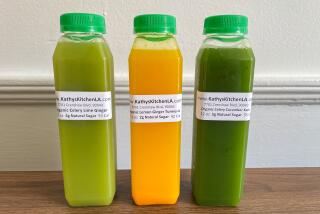Citrus Juicers That Put the Squeeze on Big and Small Jobs
- Share via
A citrus juicer can be a real blessing on a sweltering active day when you need to cool off and get energy from a nourishing cold citrus beverage. When it comes to speed and totally extracting all that precious juice for a healthy orange, lemon, lime or grapefruit drink, I vote for the electric juicer.
There are many electric juicers available and they all seem to work efficiently. Squeezing into the electric juicer shelves is a newcomer that has recently joined the U.S. arena of kitchen appliances. The European infiltrator is Bosch, bringing in its highly rated juicer as well as a full line of coffee makers, slicers, deep-fryers, mixers and more. But don’t they make automotive parts? And Blaupunkt car stereos? Same company.
The Groveland Juicer ($49.95) from Robert Bosch Corp. has half the wattage but almost double the power of some of the better juicers available. I particularly like this juicer’s reversing action. When the citrus fruit is pressed down into the cone, the motor starts and turns the cone; when the fruit is briefly lifted and depressed again, the cone turns the other way. This clockwise and counterclockwise rotation assures a fuller juice extraction.
A strainer catches the pulp and seeds while juice flows into a clear see-through bowl with handle and pour spout, which can also serve as the serving pitcher. Styled in white acrylic, the compact juicer stands only 7 1/2 inches high with a depth of 5 1/2 inches. The unit also has convenient cord storage at the base. Another great feature of the machine is its rubber feet, which keep it from “walking” (moving) while working.
For small squeezing jobs, the manual reamer provides an easy solution. The only difference between the updated Lemon Squeezer from Rosti ($4) and the old wooden lemon reamer is the type of material used. About 6 inches long, this traditional citrus press is designed with a ridged cone on one end of its handle. The tip of the reamer is pushed into the halved fruit, which is placed over a bowl. Twisting action quickly releases the juices without the pulp or seeds.
Based on collector’s items dating to the 1870s, the primitive model is lathe turned and carved from wood. Rosti’s modern implement is molded from unbreakable polypropylene and comes in white with black or red handles. The knob at the end of the handle is black and has a hole for hanging. Wooden versions, some made of beechwood, are still commonly available; some cooks may prefer them over the plastic models for the nostalgic appeal.
Another old-fashioned citrus press that is being revived these days is the dome juicer. This robot-like tool requires a little muscle power, made for those who don’t mind that extra manual effort, as well as the extra time, to get their citrus beverage nourishment. This design involves placing a citrus half into a squeezer, and, when the handle is cranked, turned or pressed down, the upper press squeezes out the juices into the glass.
Made in Italy, Leifheit’s Juicer Tutti Frutti ($40) added an extra function to its new model. Aside from being a citrus press, it can also squeeze juice from small berries and grapes. An all-plastic unit in white and tones of gray, the Leifheit Juicer is equipped with two inserts: a ridged cone insert for oranges, grapefruits or lemons and a plate for berries or grapes.
The Bosch Juicer is available at Cookin Stuff, Torrance, Kitchen World, Santa Monica and Cook’s Corner, Redondo Beach and West Los Angeles.
The Rosti Lemon Squeezer is available at Bullock’s.
The Leifheit Juicer Tutti Frutti is available at Basics, Newport Beach, and Cook’s Corner, San Diego.
More to Read
Eat your way across L.A.
Get our weekly Tasting Notes newsletter for reviews, news and more.
You may occasionally receive promotional content from the Los Angeles Times.









